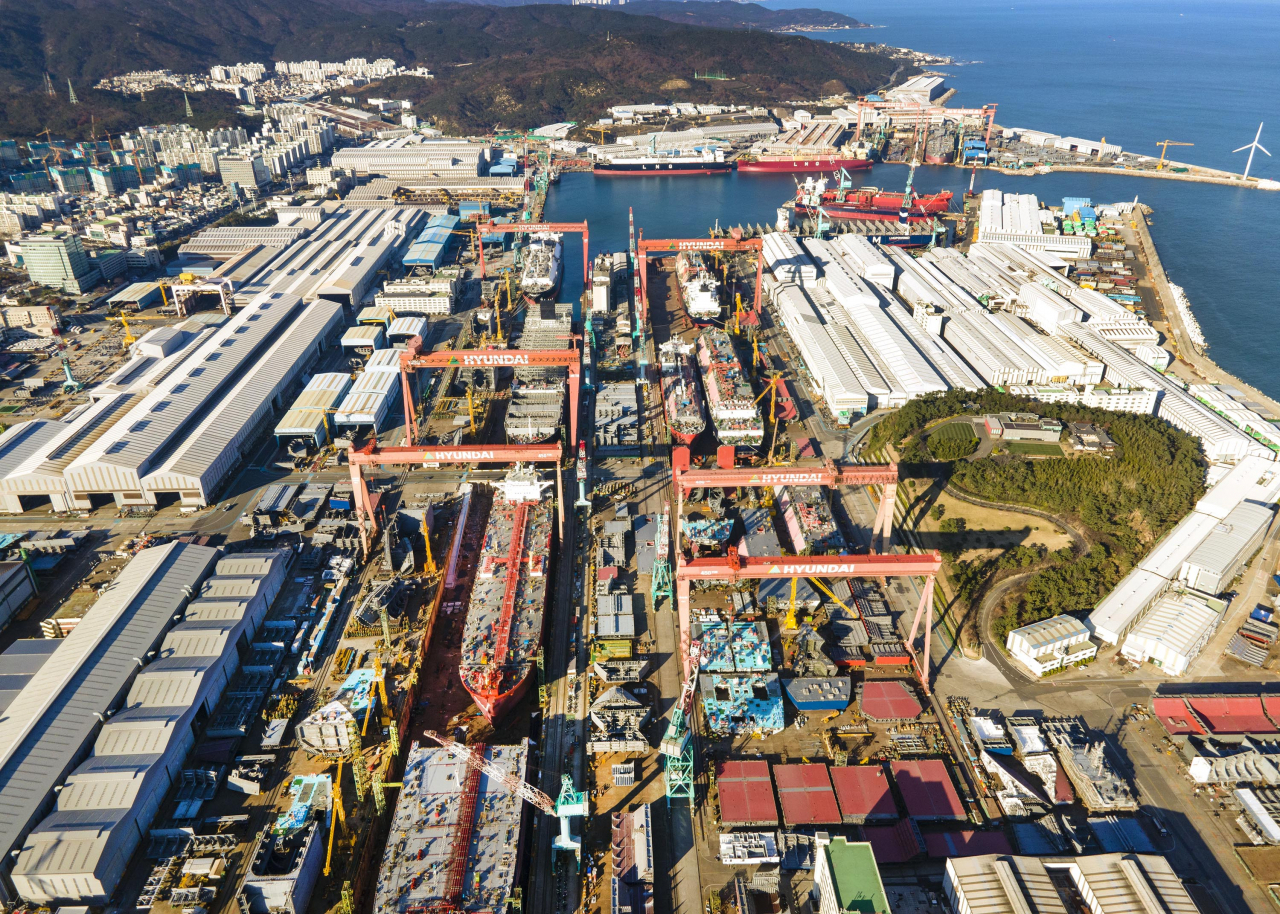Market Now
[From the Scene] Hyundai Heavy Industries aims to cement global No.1 position
 |
Hyundai Heavy Industries' shipyard in Ulsan (Hyundai Heavy Industries) |
ULSAN -- Spring has arrived early in Ulsan as cherry blossoms were in already full bloom along the streets of the southeast port city on Wednesday, about two weeks before the forecasted blossoming dates. In a similar trend, Hyundai Heavy Industries, the world’s top shipbuilder under South Korean conglomerate HD Hyundai, is enjoying the industry’s much-awaited revival as the company looks to widen its lead over global competitors on its large number of backlog orders.
The engine department of HHI, which is headquartered in Ulsan, operates 10 docks for building ships, which is the most by a shipbuilder across the globe. The docks were filled with ships being built as a group of reporters visited the company’s shipyard.
According to HHI, the remaining number of the shipbuilder’s backlog orders stood at 152 as of February, which is enough for three years of its business. The total value of the contracts amounts to about $26 billion.
Over the past 10 years, HHI has shifted its focus on building engines using eco-friendly fuels, such as liquefied natural gas and methanol, to stay ahead against global competition, namely China. According to the company, over 60 percent of the engine orders in place are based on eco-friendly fuels. HHI recently completed the testing of an engine that uses both LNG and hydrogen last year to speed up the development of hydrogen-powered ships.
“Of the backlog orders, 53 are LNG carriers. We make the most amount of ships with the best quality in the world,” Lee Man-soo, who has been working at HHI for 40 years and is now in charge of building a ship, told the reporters standing on the main deck of an LNG carrier under construction.
"Our LNG carriers are incorporated with cutting-edge technology that uses buoyancy to decrease the friction of the ship against the water. This technology helps to save 10 to 15 percent of the fuel cost in comparison with other (LNG ships built by others)," he said.
 |
A liquefied natural gas-powered ship being built at Hyundai Heavy Industries' Ulsan shipyard (Hyundai Heavy Industries) |
According to Lee, the ship is expected to be delivered to the customer before the end of the first half of the year, about two years after the contract was signed. Measuring 299 meters in length, 35.5 meters in height and 46.4 meters in width, the ship is capable of delivering 174,000 cubic meters of LNG.
HHI held an event earlier in the day to celebrate the company’s milestone of surpassing 200 million brake horsepower, or BHP, in accumulative two-stroke engine production, a feat that has never been achieved by any shipbuilder in the world. BHP is a unit of measurement that describes the amount of power an engine generates in order to operate.
The 200 million BHP is equivalent to the combined engine power of 1.25 million mid-sized sedans, the company said. HHI hit the landmark record only 44 years after it began manufacturing engines for large ships in 1979.
“Japan began (this business) about 50 years earlier than we did. We are now about 80 million BHP ahead of them as our technology is way more advanced,” said Lee Young-duck, vice president at HHI. “We have built about 2,300 ships so far, which would account for over 20 percent of the global market. We are working with some 330 customers in 52 countries.”
Regarding concerns about the shipbuilding industry facing a shortage of workers, HHI Vice Chairman Han Young-seuk said the company plans to hire up to 2,800 foreign laborers. According to Han, about 800 foreigners have been employed by the subcontractors of the three shipbuilders -- HHI, Hyundai Mipo Dockyard and Hyundai Samho Heavy Industries -- under HD Hyundai.
“We are also going to hire 200 to 300 Korean nationals this year and more in the future. Koreans have to be the ones leading the charge with technology as our company’s foundation has to grow firmly based on them,” said Han.
 |
Hyundai Heavy Industries' shipyard in Ulsan (Hyundai Heavy Industries) |


![[Global Finance Awards] Mirae Asset Securities' global top-tier ambition within reach](http://res.heraldm.com/phpwas/restmb_idxmake.php?idx=151&simg=/content/image/2024/11/27/20241127050077_0.jpg)
![[Global Finance Awards] Kyobo Life enhances insurance coverage for cancer, long-term care](http://res.heraldm.com/phpwas/restmb_idxmake.php?idx=151&simg=/content/image/2024/11/26/20241126050106_0.jpg)
![[Global Finance Awards] Kakao Bank bolsters SE Asia foray with Superbank partnership](http://res.heraldm.com/phpwas/restmb_idxmake.php?idx=151&simg=/content/image/2024/11/27/20241127050076_0.jpg)
![[Global Finance Awards] IBK boosts support for small businesses](http://res.heraldm.com/phpwas/restmb_idxmake.php?idx=151&simg=/content/image/2024/11/27/20241127050072_0.jpg)
![[Global Finance Awards] Shinhan chief pushes to boost corporate value](http://res.heraldm.com/phpwas/restmb_idxmake.php?idx=151&simg=/content/image/2024/11/27/20241127050074_0.jpg)
![[Global Finance Awards] Mirae Asset bolsters global presence with W370tr under management](http://res.heraldm.com/phpwas/restmb_idxmake.php?idx=151&simg=/content/image/2024/11/27/20241127050075_0.jpg)
